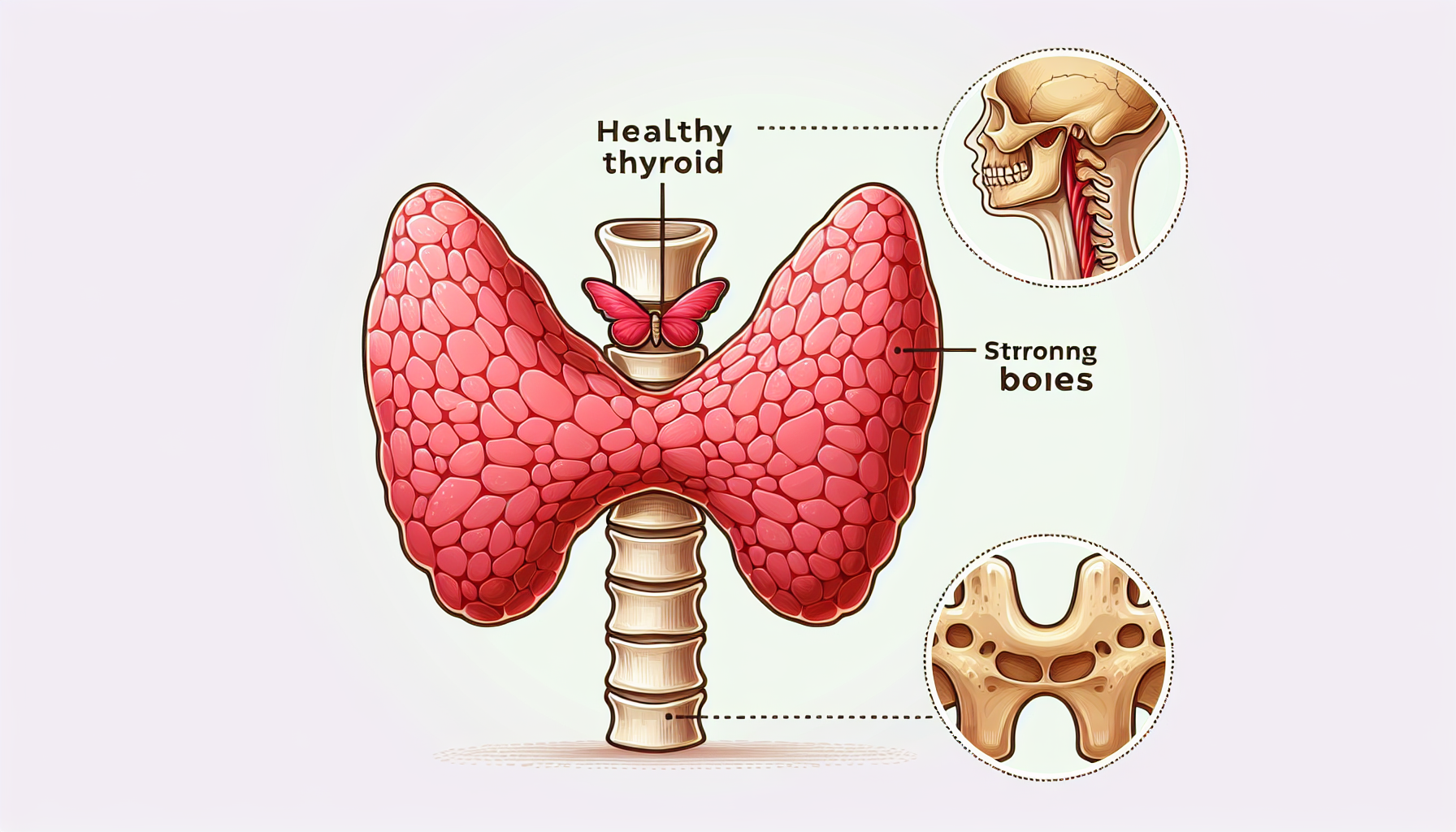The intricate dance between various bodily systems ensures the maintenance of our overall health. Among these, the harmonious interaction between thyroid health and bone density plays a critical role, though it is often overlooked. The thyroid gland, despite its small size, profoundly influences metabolic processes, including bone remodeling – the continuous cycle of bone formation and resorption. This article delves into the depths of how thyroid function impacts bone density, the implications of imbalance, and strategies to safeguard both bone and thyroid health.
Thyroid Function and Bone Health
The thyroid gland secretes hormones that regulate metabolism, energy generation, and neuromuscular function. Two primary hormones, thyroxine (T4) and triiodothyronine (T3), are instrumental in the development and health of bones. T3, the more active form, influences the activity of osteoblasts and osteoclasts, cells responsible for bone formation and resorption, respectively.
An imbalance in thyroid hormone levels can lead to altered bone density. Hyperthyroidism, characterized by an excess of thyroid hormones, can accelerate bone turnover, leading to a reduction in bone density and potentially increasing the risk of fractures. Conversely, hypothyroidism, marked by insufficient thyroid hormone production, may diminish bone remodeling activity, also impacting bone strength.
For individuals concerned about their bone health, understanding the role of the thyroid in this context is paramount. It is not just the amount of bone that matters but the quality and turnover rates that determine bone strength and resilience.
The Clinical Perspective on Thyroid and Bone Density
Clinically, the connection between thyroid health and bone density is evident in conditions such as osteoporosis, where bone density is significantly compromised. Studies show that prolonged thyroid hormone imbalance, especially hyperthyroidism, is a known risk factor for osteoporosis.
Moreover, the treatment for thyroid disorders often includes medications that can have side effects on bone health. For instance, antithyroid drugs used in hyperthyroidism may impact bone turnover. It is essential for healthcare providers to monitor bone density in patients undergoing long-term thyroid treatment.
The Role of Diet and Supplements
Nutrition plays a vital role in maintaining both thyroid and bone health. A diet rich in calcium and vitamin D is essential for bone health, as these nutrients are crucial for bone formation and maintenance. Iodine is a key mineral for thyroid health since it is a component of thyroid hormones.
Incorporating a balanced diet with adequate nutrients can support thyroid function and bone health simultaneously. For those looking to enhance their bone density through diet, exploring nutritional tips for maximizing bone density post-menopause can provide valuable insights.
Exercise: A Dual Benefit for Thyroid and Bones
Physical activity is another cornerstone for both thyroid and bone health. Weight-bearing and muscle-strengthening exercises can improve bone density by stimulating bone formation. Exercise also boosts metabolism, which can indirectly support healthy thyroid function.
For those interested in specific exercises to enhance bone strength, it is worthwhile to understand the impact of weight-bearing exercises on bone health.
External Resources for Further Reading
To deepen your understanding of the connection between thyroid health and bone density, consider exploring these niche resources:
- The National Osteoporosis Foundation provides comprehensive information on maintaining bone health, including the effects of thyroid disorders (National Osteoporosis Foundation).
- The American Thyroid Association offers detailed resources on thyroid disease and its implications for bone density (American Thyroid Association).
- EndocrineWeb features articles by endocrinologists on the nuances of thyroid function and bone health (EndocrineWeb).
Monitoring and Managing Thyroid and Bone Health
Regular screening and monitoring are crucial for maintaining thyroid and bone health. Thyroid function tests can detect imbalances early, allowing for timely intervention. Similarly, bone density scans can identify changes in bone mass, enabling preventive measures or treatment.
For individuals with thyroid disorders, particularly those on long-term medication, bone density monitoring becomes even more significant. The importance of such monitoring is highlighted in athletes, as discussed in the article on the importance of bone density monitoring in athletes.
The Interplay of Medication and Supplements
Medications for thyroid disorders, alongside supplements for bone health, must be carefully managed. Over-supplementation with calcium or vitamin D, for instance, may have unintended consequences on bone remodeling and thyroid function. A balance is necessary, and healthcare professionals can guide patients on the appropriate use of medication & supplements.
Conclusion
The interconnection between thyroid health and bone density is a complex but critical aspect of overall well-being. By understanding this relationship, individuals can take proactive steps to support both thyroid function and bone health. From dietary choices and exercise to regular monitoring and mindful medication management, there are numerous paths to maintain this delicate balance.
In conclusion, preserving the harmony between thyroid and bone health requires a multifaceted approach, integrating medical knowledge, lifestyle modifications, and continuous learning. By staying informed and proactive, one can ensure the longevity and strength of both their bones and thyroid function.



